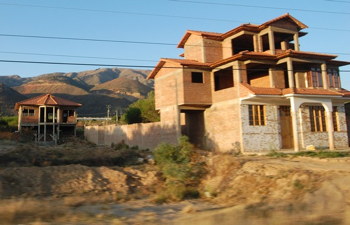View Photo Gallery (7 photos):
Bolivian migrants ride out hard times
November 18, 2011 - Washington Post
by Emily Alpert
CLIZA, Bolivia -- Everything seems to be under construction in this town in central Bolivia. McMansions topped with tile and ornamental swans look as though they dropped from the sky. Hulking concrete shells sit on stilts. Metal spikes rise from countless roofs in hopes of a second floor.
But even when the grandest new houses are finished, many sit empty and dark while their owners are away working in Spain or Argentina, building houses for other people.
"They'll build a house and have nothing to eat. So they have to leave again," architect Jose Cano Escobar said.
In Bolivia, among the poorest countries in the Americas, one of the biggest exports is Bolivians. The World Bank estimates that nearly 7 percent of Bolivians live elsewhere; the Bolivian government says more than 20 percent do. In towns near Cliza in the Valle Alto region, researchers have pegged that number at 40 percent or higher.
When the economy soured in Europe and the United States, slowing remittances to Bolivia, some here expected migrants to flood back. But most appear to be toughing it out abroad. The money has begun to flow again. And Cliza remains something of a ghost town, its empty mansions proof of the enduring pull of migration.
"They think, 'If I return to Bolivia, it will be even worse,' " said Napoleon Pacheco, director of the Milenio Foundation, a Bolivian think tank that studies economic and social problems.
Before the boom went bust, Bolivian migrants sent back nearly $1.1 billion in a single year, according to the Inter-American Development Bank. The flaccid finances of Europe and the United States took their toll from 2008 to 2010, cutting remittances by roughly 12 percent.
But this year, Bolivian migrants began to send more money again, according to the Bolivian central bank. That echoes the recent trend across Latin America, where remittances are steady or growing.
The growing sum is a sign that migrants stuck it out. Spain actually tried to pay immigrants to return home, but far fewer accepted the offer than expected, according to Spanish government statistics.
"They adapted," said Ricardo Martinez, migration director at the Association of Bolivia-Spain Cooperation. "If they worked in construction before, now they work in a bakery or child care."
In Bolivia, nowhere is the tradition of migrating stronger than in the Valle Alto, a vast, dry stretch of big-sky country southeast of Cochabamba, the fourth-largest city in the nation.
Bolivians from this part of the country first headed to the salt mines of Chile, then to Argentina. Then to the suburbs of Washington, D.C., now home to the biggest Bolivian community in the United States. In more recent years, they have flocked to Spain.
Migrating is now a rite of passage for many young people who live in Cliza and neighboring towns. If a 20-something stays in Cliza, researcher Leonardo de la Torre said, neighbors begin to ask, "Why aren't you taking advantage of your chance?"
The soaring stories and glossy tile in Cliza have become status symbols of sorts. "It's a competition," said Limbert Quiroga, who is from Cliza but works in Washington's Virginia suburbs. He has already built a house back home and now is saving up to start a hardware store.
"They'll bring photos. 'I've got a better house!' 'No, I do!' '' kidded Rene Ontiveros, an auto mechanic working in Virginia who used to live in Cliza.
Back in the Valle Alto, some say migration has hurt Cliza. Math and science teacher Francisco Borde worries about families broken by long absences. Rigoberto Velasco, born in Cliza 80 years ago, complains that nobody invests in improving the town. And Ramiro Numbela, a sculptor, said the "European" homes are a sign that Cliza is losing its identity.
"They even name their children Michael or Kevin or John," Numbela said.
Milton Escobar Salazar spent nine years in Spain as a construction worker. He is now building a house of his own for his wife and little girl. Its three stories peer over the rest of the neighborhood -- all under construction.
"It's a fusion," he said proudly. "Something of Europe and a little bit of here."
Emily Alpert reported this story on a fellowship with the International Reporting Project.
